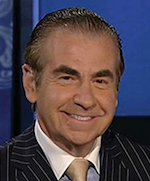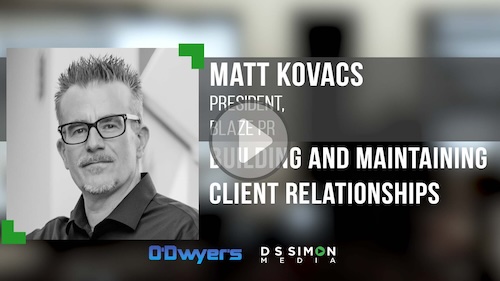 |
| Fraser Seitel |
Quarterback Tom Brady is the G.O.A.T, the greatest of all time. Rappers Snoop Dogg and Tupac Shakur were O.G., original gangsta. And now, Pennsylvania senatorial candidate John Fetterman has merited the W.I.A.T., the worst interview of all time.
Fetterman is the Democrat Lieutenant Governor of Pennsylvania who suffered a debilitating stroke in May but has continued to press on against Republican Dr. Mehmet Oz in the battle to become Pennsylvania’s next U.S. Senator.
In light of his illness, Fetterman has generally avoided such traditional campaign activities as public debates or addressing large crowds or even sitting for media interviews. And the strategy was working well, as the candidate and his campaign led in the polls heading into the election.
And then, one day in October, with less than a month to go before the election, the Fetterman public relations brain trust decided to invite NBC News in for the candidate’s first major one-on-one TV interview. It was, quite literally, the worst interview of all time.
Fetterman, dressed in his traditional hoodie sweatshirt, sat behind a desktop computer that relayed closed-caption questions in real-time from NBC News correspondent Dasha Burns, who sat immediately in front of him. Well, maybe not “real-time”—more like tape delay—as it took several silent seconds for the candidate to read and take in the questions and then compose halting, deliberative responses. The whole thing made for riveting, memorable television but was also grotesquely sad, unfortunate and frankly, creepy.
In cueing up the interview, Burns even acknowledged to anchor Lester Holt, “In small talk before the interview, without captioning, it wasn’t clear he understood our conversation.”
The immediate impact of the Fetterman interview was as head-scratching as it was damning. Of course, one had to feel great empathy for anyone in such a dreadful position, forced to face millions of gawking anonymous onlookers in the midst of recovering from a grave, near fatal illness.
But for students of public relations, the real question was how on earth could any professional communicator agree to—or worse, recommend—such a high-profile, publicly-embarrassing, election-ruining interview? Who was the public relations counselor who decided that the candidate should commit network hara-kiri? The name of Fetterman’s public relations advisor was … of little consequence. Whoever it was, they concluded—for better or more likely worse—that it made sense for the candidate to take the risk of the interview.
What’s important for every public relations counselor is to examine the genesis of the decision to accept the interview and, specifically, consider the questions that every communications advisor must ask him or herself before making such a momentous determination for a client.
First, what can we gain from such a high-profile interview?
With a month left till the election and Oz raising the heat on Fetterman to agree to at least one debate, the campaign felt increasing pressure to acquiesce. It’s understandable that Fetterman’s advisors, confident in their candidate’s knowledge of the issues and his “just plain folks’ demeanor”—especially compared to the elitist Dr. Oz—would be willing to risk one short interview with a “sympathetic” interviewer.
NBC, the consultants clearly felt, was, indeed, not only “sympathetic” to Fetterman, his principles and his predicament, but also “friendly” to his more progressive positions. Thus, again, the toe-in-the-water interview would be a risk worth taking.
Finally, the counselors reasoned that once Pennsylvania voters saw for themselves that Fetterman, afflicted as he clearly was with an illness, could nonetheless still think clearly, they would be reassured to give him their vote.
All of these factors likely weighed into the decision to allow the interview.
Second, what can we lose from such a high-profile interview?
On the other hand, exposing Fetterman to the one-on-one interview ran the risk of corroborating to undecided voters that this was a far more impeded candidate than they might have imagined.
Up until the NBC interview, as noted, the Fetterman campaign correctly kept the candidate out of the limelight, using proxy communications, rather than personal ones to illustrate who he was and what he stood for. Most Pennsylvanians had seen Fetterman only in TV and digital ads—$4.4 million worth—most of which either featured supportive surrogates or highlighted Dr. Oz as a preening carpetbagger from New Jersey. Those few ads that did show the candidate in action pictured Fetterman walking tall, talking tough and looking vibrant.
That’s why the real candidate’s NBC interview “reintroduction” to the voting public was so jarring. This was clearly not the same confident, candid, robust bear of a man highlighted in campaign commercials.
“The emperor has no clothes,” chided detractors. And even supporters—who fiercely defended the candidate’s mental fitness—had to be dismayed.
Third, what’s the worst thing that can happen from a bad interview?
This is the key question that every public relations counselor must ask in every public relations situation: “As a result of this that I’m suggesting, what is the worst thing that can happen?”
In this case, Fetterman’s advisors failed to appreciate several unfortunate but inarguable facts about today’s electorate.
- In the 2020 presidential election. 3.4 million Pennsylvanians—nearly half the state—voted for Donald Trump. So, the margins between Democrats and Republicans were far too close to risk a last-minute public relations Hail Mary.
- Fetterman’s state support was already razor thin. Fetterman, in the best of times, was never an appealing candidate. Not only did he dress like a schlep—even Donald Trump had respect enough for the office to wear a suit and tie—but his work record was spotty and his background, like his opponent’s, was privileged.
- Americans in 2022 are visually oriented. They prefer Tik Tok and Instagram to newspapers and novels. They believe what they see rather than what they read. They’re long on pictures and short on research. So, if they somebody who looks ill and acts differently, the image remains.
In other words, the recommendation to submit to the one-on-one NBC interview was the wrong public relations decision. And it just may be the crucial factor in why the Republicans will win the Pennsylvania senate race.
***
Fraser P. Seitel has been a communications consultant, author and teacher for 40 years. He is author of the Pearson text “The Practice of Public Relations,” now in its 14th edition, and co-author of “Rethinking Reputation" and "Idea Wise.” He may be reached directly at [email protected].










 Have a comment? Send it to
Have a comment? Send it to 
Oct. 18, 2022, by Joe Honick
I have frequently disagreed with Fraser in recent months, but not this time.